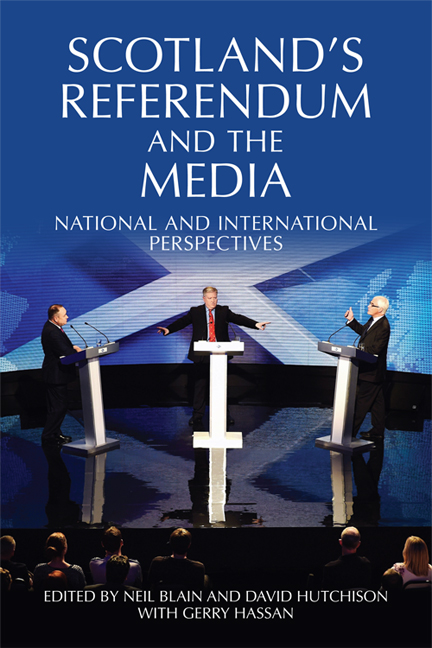Book contents
- Frontmatter
- Contents
- Preface
- Part One The Referendum in Scotland
- Part Two Views from the UK
- Part Three International Perspectives
- 13 ‘Knock-on Consequences’: Irish Media Coverage of the Scottish Referendum
- 14 Spain, Catalonia and the Scottish Referendum: A Study in Multiple Realities
- 15 The French View
- 16 The Scottish Referendum in Austrian, German and Swiss Media
- 17 The Scottish Referendum: The View from Quebec
- 18 The Scotland Referendum in the English-language Canadian Media
- 19 Australia and the Scottish Independence Referendum
- 20 Afterword: Reimagining Scotland in a New Political Landscape
- Notes on the Contributors
- Index
20 - Afterword: Reimagining Scotland in a New Political Landscape
from Part Three - International Perspectives
Published online by Cambridge University Press: 05 August 2016
- Frontmatter
- Contents
- Preface
- Part One The Referendum in Scotland
- Part Two Views from the UK
- Part Three International Perspectives
- 13 ‘Knock-on Consequences’: Irish Media Coverage of the Scottish Referendum
- 14 Spain, Catalonia and the Scottish Referendum: A Study in Multiple Realities
- 15 The French View
- 16 The Scottish Referendum in Austrian, German and Swiss Media
- 17 The Scottish Referendum: The View from Quebec
- 18 The Scotland Referendum in the English-language Canadian Media
- 19 Australia and the Scottish Independence Referendum
- 20 Afterword: Reimagining Scotland in a New Political Landscape
- Notes on the Contributors
- Index
Summary
As matters turned out, the independence referendum proved as much a beginning as an end; or perhaps just another stage in the constitutional re-imagining of Scotland. As the months passed after September 2014, its impact on public and media alike became continuous with what seemed to be the entry of the Scottish constitutional question into the heart of British politics.
This chapter has two main purposes. First, it extends discussion of significant trends in general media coverage of the Scottish constitutional issue, reconsidering some continuities from 2012 until the day when the new Westminster Parliament convened on 18 May 2015. This aspect of the discussion also further addresses, in a broad context, some questions of media influence and of partisanship and impartiality.
The chapter additionally summarises the findings of a number of the volume's contributors, who took the opportunity to gauge reactions in their own nations to the electoral events of May 2015, and communicated their thoughts to us by email.
Looking first at developments in the UK media, a direct result of the SNP poll surge in the wake of the referendum was that traditional London-produced accounts of elections on television, which in previous elections had spoken of ‘the three main parties’ as Labour, Conservative and Liberal Democrat, started to take account of the SNP. That is to say, some UK news broadcasts on the BBC, Sky, ITV and Channel 4 began to include the SNP in their general consideration of British/Westminster politics; although, and right up until the election, other news editions on all of these channels often produced more traditional accounts too, with the ‘big three’ parties, as formerly defined, to the fore.
Such episodes of inclusiveness did not invariably indicate that London-based reporters or editors were beginning to understand Scottish politics any better than previously. This could be seen in responses to the report of the Smith Commission in late November 2014, the establishment of which was announced by David Cameron the morning after the referendum vote. The Commission was charged with producing proposals for the further devolution to which the main Westminster parties had committed after fears of a Yes win.
- Type
- Chapter
- Information
- Scotland's Referendum and the MediaNational and International Perspectives, pp. 228 - 241Publisher: Edinburgh University PressPrint publication year: 2016

